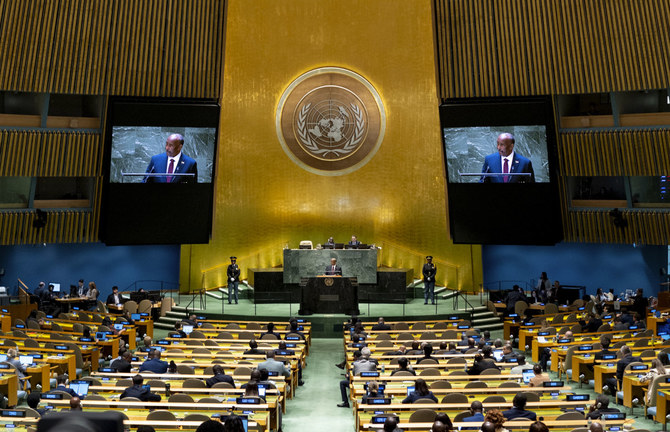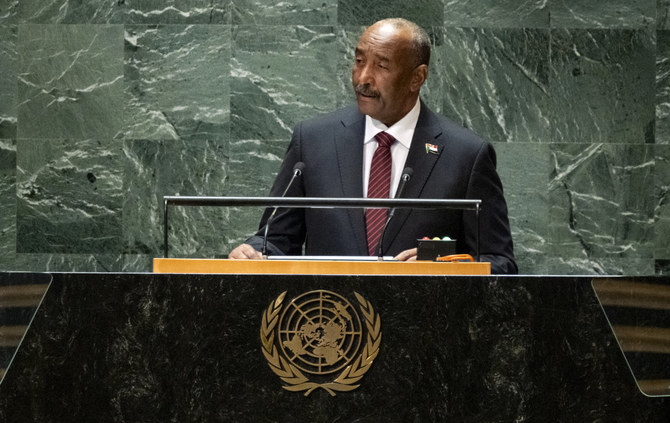UNITED NATIONS: The heads of Sudan’s rival military factions gave competing addresses to the United Nations on Thursday, one from the podium at UN headquarters in New York and the other in a rare video recording from an undisclosed location.
Army leader Abdel Fattah Al-Burhan, speaking at the United Nations, called on the international community to designate the paramilitary Rapid Support Forces (RSF) as a terrorist organization and to counter its sponsors outside Sudan’s borders, warning that months of war could spill over in the region.
RSF leader Mohamed Hamdan Dagalo, known as Hemedti, said in a video message that his forces were fully prepared for a cease-fire and comprehensive political talks to end the conflict.
Most of Hemedti’s recent communications have been audio messages, and his whereabouts have been a source of speculation.
In the video released on Thursday shortly before Burhan spoke, Hemedti appeared in military uniform, seated behind a desk with a Sudanese national flag behind him as he read out his speech. His location was not clear.
“Today we renew our commitment to the peaceful process to put a halt to this war,” Hemedti said. “The RSF are fully prepared for a cease-fire throughout Sudan to allow the passage of humanitarian aid ... and to start serious and comprehensive political talks.”
Both sides blamed the other for starting the war that erupted in mid-April in Khartoum and has spread to other parts of the country including the western region of Darfur, displacing more than 5 million people and threatening to destabilize the region.
Saudi Arabia and the United States have tried to secure a lasting cease-fire in Sudan but the process stalled amid parallel international initiatives in Africa and the Middle East.
Tentacles of Wagner group
Burhan, the de facto ruler of Sudan since a 2021 coup, alluded to the rival RSF'S ties with Wagner, the Russian mercenary group hit by Western sanctions over alleged abuses in Africa.
“The danger of this war is now a threat to regional and international peace and security as those rebels have sought the support of outlaws and terrorist groups from different countries in the region and the world,” Burhan said.
“This is like the spark of war, a war that will spill over to other countries in the region,” he said.
“Regional and international interference to support these groups is crystal clear by now. This means that this is the first spark that will burn the region, and will have a direct impact on regional and international peace and security.”
War broke out on April 15 after the collapse of a plan to integrate the army and the RSF.
The fighting in Sudan has killed at least 7,500 people, according to the NGO Acled, and displaced some five million people, dealing a new, devastating blow to efforts to bring democracy to Sudan.
Burhan has increasingly been traveling around the world in what are seen as efforts to burnish his legitimacy.
At the United Nations, he urged world powers to designate the Rapid Support Forces, or RSF, as a terrorist group.
“They have committed all sorts of crimes that give grounds for such a designation,” he said.
“Those who have supported killing, burning, raping, forced displacement, looting, stealing, torture, trafficking of arms and drugs, bringing mercenaries or recruiting children — all such crimes necessitate accountability and punishment,” he said.
The United States earlier this month imposed sanctions on RSF leaders including senior commander Abdelrahim Hamdan Daglo, the brother of the group’s leader, over alleged abuses including the killing of the governor of West Darfur.
But the United States and other Western powers have also been strongly critical of Burhan.
Alongside RSF leader Daglo, Burhan in 2021 sidelined the civilian leadership that had been part of a transitional power-sharing deal following mass protests that brought down longtime dictator Omar Al-Bashir.
“We are still committed to our previous pledges to transfer power to the people of Sudan with great national consensus and consent,” he said.
“The armed forces would leave politics for once and for all.”


















